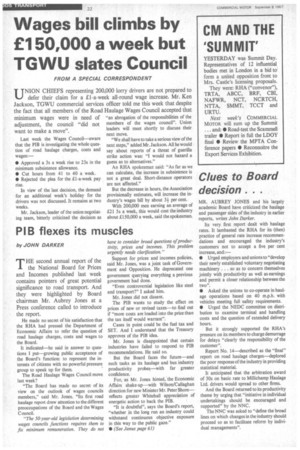PIB flexes its muscles
Page 24

If you've noticed an error in this article please click here to report it so we can fix it.
by JOHN DARKER
THE second annual report of the the National Board for Prices and Incomes published last week contains pointers of great potential significance to road transport. And they were highlighted by Board chairman Mr. Aubrey Jones at a Press conference called to introduce the report.
He made no secret of his satisfaction that the RHA had pressed the Department of Economic Affairs to refer the question of road haulage charges, costs and wages to the Board.
It indicated—he said in answer to questions I put—growing public acceptance of the Board's function: to represent the interests of citizens with no powerful pressure group to speak up for them.
The Road Haulage Wages Council move last week?
"The Board has made no secret of its view on the outlook of wages councils members," said Mr. Jones. "Its first road haulage report drew attention to the different preoccupations of the Board and the Wages Council.
"The 50-year-old legislation determining wages councils functions requires them to fix minimum remuneration. They do not have to consider broad questions of productivity, prices and incomes. This problem urgently needs clarification."
Support for prices and incomes policies, said Mr. Jones, was a joint task of Government and Opposition. He deprecated one government querying everything a previous government had done.
"Even controversial legislation like steel and transport?" I asked him.
Mr. Jones did not dissent.
The PIB wants to study the effect on prices of new or revised taxes—to find out if "more costs are loaded into the price than the tax itself would warrant".
Cases in point could be the fuel tax and SET. And I understand that the Treasury approves of the PII3 idea.
Mr. Jones is disappointed that certain industries have failed to respond to P113 recommendations. He said so.
But the Board faces the future—and such tasks as its haulage and bus industry productivity probes—with far greater confidence.
For, as Mr. Jones hinted, the Economic Affairs shake-up—with Wilson/Callaghan direction for new Minister Mr. Peter Shore— reflects greater Whitehall appreciation of energetic action to back the PIB.
"It is doubtful", says the Board's report, "whether in the long run an industry could withstand continuous objective exposure in this way to the public gaze."
• (See Janus page 61)




















































































































